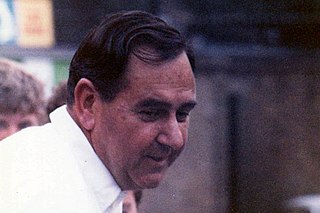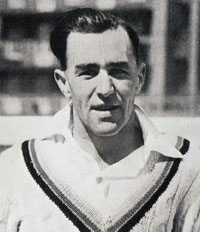Related Research Articles

Michael Colin Cowdrey, Baron Cowdrey of Tonbridge, was an English cricketer who played for Kent County Cricket Club from 1950 to 1976, and in 114 Test matches for England from 1954 to 1975. He was born in Ootacamund, Madras Presidency, British India and died in Littlehampton, West Sussex.
Michael John Knight Smith, better known as M. J. K. Smith or Mike Smith, is an English double international, in cricket and in rugby union.
Greville Thomas Scott Stevens was an English amateur cricketer who played for Middlesex, the University of Oxford and England. A leg-spin and googly bowler and attacking batsman, he captained England in one Test match, in South Africa in 1927. He was widely regarded as one of the leading amateur cricketers of his generation who, because of his commitments outside cricket, was unable to fulfil his potential and left the game early.

Norman Walter Dransfield Yardley was an English cricketer who played for Cambridge University, Yorkshire County Cricket Club and England, as a right-handed batsman and occasional bowler. An amateur, he captained Yorkshire from 1948 to 1955 and England on fourteen occasions between 1947 and 1950, winning four Tests, losing seven and drawing three. Yardley was named Wisden Cricketer of the Year in 1948, and in his obituary in Wisden Cricketers' Almanack he was described as Yorkshire's finest amateur since Stanley Jackson.
The MCC in 2005 started the season fielding what was virtually an England A side against the Champion County, which they won. MCC teams played around 450 games throughout the season, although only two of them involved senior professional players:
Norman Gifford is a retired English cricketer, who played primarily as a left-arm spinner. Gifford played county cricket for Worcestershire, and Warwickshire County Cricket Clubs, and represented England in fifteen Test matches and two One Day International between 1964 and 1985.
Fred Barratt played first-class cricket for Nottinghamshire County Cricket Club from 1914 to 1931 and represented England in five Test matches, one in the home series against South Africa in 1929 and four on the inaugural Test series against New Zealand in the 1929–30 season. He was born in Annesley, Nottinghamshire and died at Nottingham General Hospital, Nottingham.
Paul Antony Gibb was an English cricketer, who played in eight Tests for England from 1938 to 1946. He played first-class cricket for Cambridge University, Yorkshire and Essex, as a right-handed opening or middle order batsman and also kept wicket in many matches.

William Gilbert Anthony Parkhouse was a Welsh cricketer who played in seven Tests for England in 1950, 1950–51 and 1959.
John Alexander Jameson is a former English cricketer who played in four Test matches and three One Day Internationals for the England cricket team between 1971 and 1975. Jameson played for Warwickshire County Cricket Club from 1960 until 1976.
Peter May captained the English cricket team in Australia in 1958–59, playing as England in the 1958–59 Ashes series against the Australians and as the MCC in their other matches on the tour. It was widely regarded as one of the strongest teams to depart English shores, comparable with the great teams of Johnny Douglas in 1911-12 and Percy Chapman in 1928-29. It had no obvious weaknesses, and yet it was beaten – and beaten badly. By the First Test the top batsmen had made runs, the Surrey trio of Loader, Laker and Lock had taken wickets, as had Lancashire's Brian Statham. South Australia, Victoria and an Australian XI had all been beaten – the last by the crushing margin of 345 runs – and all seemed rosy for Peter May's touring team. But in the Brisbane Test they lost by 8 wickets and the rest of the series failed to offer any hope of reversing their fortunes. The reasons for their failure were manifold; the captain was too defensive; injuries affected their best players; others were too young and inexperienced such as Arthur Milton, Raman Subba Row, Ted Dexter, Roy Swetman and John Mortimore, or at the end of their career; Godfrey Evans, Trevor Bailey, Jim Laker, Willie Watson and Frank Tyson. Their morale was further bruised when faced with bowlers of dubious legality and unsympathetic umpires. Peter May was criticised for seeing his fiancée Virginia Gilligan, who was travelling with her uncle the Test Match commentator Arthur Gilligan. The press blamed the poor performance on the team's heavy drinking, bad behaviour and lack of pride – a foretaste the treatment losing teams would receive in the 1980s. It was not a happy tour by any means and it would take 12 years to recover The Ashes. As E.W. Swanton noted
It was a tour which saw all sorts of perverse happenings – from an injury list that never stopped, to the dis-satisfaction with umpiring and bowlers' actions that so undermined morale. From various causes England gave below their best...
M.J.K. Smith captained the English cricket team in Australia in 1965–66, playing as England in the 1965–66 Ashes series against the Australians and as the MCC in their other matches on the tour. The 5-Tests series ended in 1–1 draw. Although they failed to reclaim the Ashes this was not unexpected as the Australian press labelled them the weakest MCC team to arrive in Australia and the bookmakers were giving odds of 7/2 on their winning the series. These views rapidly changed as they set about winning their state matches with exciting, aggressive cricket and by the First Test the odds against them had been reduced to evens. Lindsay Hassett said "other teams from England may have been better technically but none had tried so hard to make the game as interesting as possible". Financially the tour's receipts were much lower than in 1962–63 due to the number of rain-affected games in a wet Australian summer and the general doldrums of the sixties.
1947 was the 48th season of County Championship cricket in England. It is chiefly remembered for the batting performances of Denis Compton and Bill Edrich who established seasonal records that, with the subsequent reduction in the number of first-class matches, will probably never be broken. Their form was key to their team Middlesex winning the County Championship for the first time since 1921, although they were involved in a tight contest for the title with the eventual runners-up Gloucestershire, for whom Tom Goddard was the most outstanding bowler of the season. Compton and Edrich were assisted by the fact that it was the driest and sunniest English summer for a generation, ensuring plenty of good batting wickets.
Albert Brian Jackson is a former English cricketer. who played for Derbyshire from 1963 to 1968 and for MCC in 1967.
The Indian cricket team toured England in the 1959 season. The team played five Test matches against England and lost them all: the first time that England had won all the matches in a five-match series. Only one of the Tests, the game at Manchester, went into the fifth day.
The New Zealand cricket team toured England in the 1949 season. The team was the fourth official touring side from New Zealand, following those in 1927, 1931 and 1937, and was by some distance the most successful to this date. The four-match Test series with England was shared, every game ending as a draw, and of 35 first-class fixtures, 14 were won, 20 drawn and only one lost.

A cricket team representing England toured Australia in the 1932–33 season. The tour was organised by the Marylebone Cricket Club and matches outside the Tests were played under the MCC name. The tour included five Test matches in Australia, and England won The Ashes by four games to one. The tour was highly controversial because of the bodyline bowling tactics used by the England team under the captaincy of Douglas Jardine. After the Australian tour was over, the MCC team moved on to play in New Zealand, where two further Test matches were played.
Humphrey Adam Gilbert was an Indian-born English first-class cricketer who played in 118 matches. All of these were in England, with the majority for Worcestershire and Oxford University. Very much a specialist bowler, his Wisden obituary commented that "His qualities as a batsman [could] be gauged from the fact that in his five innings against Cambridge he scored one run." He was nicknamed Barmy Gilbert.
The England cricket team toured South Africa under the auspices of the Marylebone Cricket Club from December 1905 to March 1906. There were five Test matches, and seven first-class games against South African provincial teams. While the team won a number of their first-class matches, they also lost several, and South Africa won the Test series 4 to 1.
Guy Fife Earle was an English cricketer who played first-class cricket for Surrey and Somerset for 20 years before and after the First World War. He also played in India, Sri Lanka, Australia and New Zealand as a member of official Marylebone Cricket Club touring teams, though he did not play Test cricket.
References
- 1 2 3 Bateman, Colin (1993). If The Cap Fits. Tony Williams Publications. p. 149. ISBN 1-869833-21-X.
- ↑ Oxford University v MCC, 1958
- ↑ Hampshire v Oxford University, 1959
- ↑ Oxford University v Free Foresters, 1960
- ↑ New Zealand v England, 1962/63
- ↑ Essex v Warwickshire, 1965
- ↑ Warwickshire v Glamorgan, 1972
- ↑ Warwickshire v Northamptonshire, 1972
- ↑ Australia v England, Champions Trophy SF 2009, Commentary